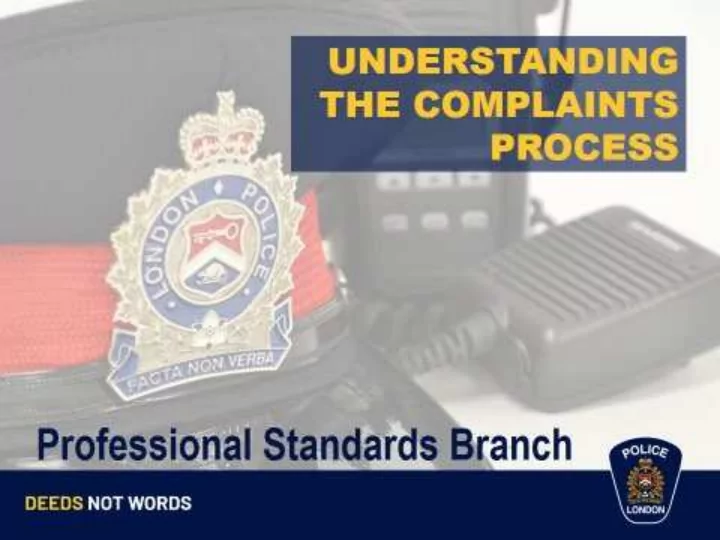

Types of Complaints There are three types of complaints: 1) Service complaints – complaints about the service provided by police; can be an OIPRD or local complaint 2) Policy complaints – complaints about policies or procedures of a police service; can be an OIPRD or local complaint 3) Misconduct by a sworn police officer – these are complaints about the conduct of an officer; can be a Chief’s, OIPRD or local complaint
Origin of Complaints • OIPRD Complaints – Filed directly to OIPRD by a member of the public - Part V PSA. OIPRD reviews each complaint and directs process: • Retain for investigation • Direct another agency to investigate • Direct originating agency to investigate • Not dealt with or “screened out” • if complaint found to be frivolous, vexatious, made in bad faith • More appropriately dealt with under another Act or law
Origin of Complaints (con’t) • Local Complaints – Filed directly to the police service by a member of the public. • Completed by a supervisor • Supervisor must advise complainant of the OIPRD complaints process • All local complaints are reviewed by the Professional Standards Branch (PSB) • Chief’s Complaints – Generated internally by the Chief - Part V PSA
Misconduct Complaints PSA Code of Conduct • Applies to sworn members only • Misconduct complaints can come from an internal Chief’s complaint or an OIPRD public complaint • Misconduct is defined within the PSA: • Discreditable Conduct • Insubordination • Neglect of Duty • Unlawful or Unnecessary Exercise of Authority • Deceit • Breach of Confidence • Corrupt Practice • Consuming Drugs or Alcohol in a manner prejudicial to Duty
Chief’s Complaints vs. OIPRD Complaints • Both focus on allegations of misconduct by a sworn member • Chief’s – investigation is initiated internally, with the knowledge and approval of the Chief of Police • OIPRD – investigation is initiated by a citizen, the public complainant • PSB investigates, completes report making a recommendation to substantiate or unsubstantiated the allegation of misconduct • Report goes to the Chief for adjudication
Results of Investigation Chief will determine if misconduct is: 1) Unsubstantiated 2) Substantiated If substantiated, Chief must determine if misconduct is “serious” or “not of a serious nature ”. Serious misconduct = Formal Discipline (PSA Hearing) Not of a serious nature = Informal Discipline • The PSA outlines the use of both formal and informal discipline within the legislation. • The PSA does not define what constitutes informal or formal discipline. This is within the discretion of the Chief.
Serious vs. Not of a Serious Nature Making this determination will be done on a case by case basis. The totality of the circumstances are considered and may include: • Nature and seriousness of the incident • Circumstances surrounding the incident • Utilization of the principles of counselling, guidance and training • Application of the concept of progressive discipline • What the police service has done in the past in similar fact cases • What other police services have done with similar fact cases
Serious vs. Not of a Serious Nature (con’t) • Has the conduct called into question public trust or confidence in the police? • Does the conduct violate community standards for police behaviour? • Has the behaviour/misconduct been ongoing over a period of time? • Has the officer attempted to cover up his/her behaviour by intentionally misleading investigating officers? • The Disciplinary record of the officer
Serious vs. Not of a Serious Nature • Same factors will be considered regardless of Chief’s investigation or OIPRD investigation • Chief will decide the route the discipline will take for all substantiated matters
Disclosure to the Public What can be disclosed to the public? Only matters going to a Formal PSA Hearing. Informal discipline and unsubstantiated allegations cannot be made public.
Confidentiality and the PSA Section 95, PSA E very person engaged in the administration of this part shall preserve secrecy with respect to all information obtained in the course of his or duties under this Part and shall not communicate such information to any other person except,
Confidentiality and the PSA Sec 95, con’t (a) as may be required…administration of this Act and regulations; (b) To his or her counsel; (c) … for law enforcement purposes (d) With the consent of the person, if any, to whom the information relates.
What is made Public with a Chief’s Complaint? Unsubstantiated and Substantiated Informal Discipline • Results and disposition are not made public • This is a disciplinary matter governed by the employer employee relationship • It is personal information which cannot be disclosed
What is made Public with a Chief’s Complaint? Substantiated Formal Discipline • Results will be made public through the PSA Hearings process • Disposition is publicly reported on through the Hearing
What is made Public with an OIPRD complaint? Unsubstantiated and Substantiated Informal Discipline • Results of the investigation are made available to the public complainant and to the OIPRD • If substantiated “less serious in nature”, Informal Discipline is to be imposed • Results are not made available to the public • The PSA directs release of this information to the OIPRD and to the public complainant – as part of the Public Complaints system • The public complainant has 30 days to request a review from OIPRD
What is made Public with an OIPRD complaint? Substantiated Formal Discipline • Results and disposition will be made public through the PSA Hearing process • Same as for a Chief’s Complaint, PSA Hearing
THANK YOU
Recommend
More recommend